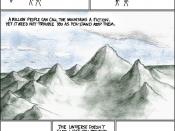At one time or as. People from all over the world can be biased, and may believe that their culture, religion, and beliefs are authentic. People who think like this are know to be ethnocentric, not giving any acknowledgments to other beliefs (of how the earth and inhabitants were created). Ethnocentrism hathe history and myths of other parts of the world. Perhaps, he didn't think other people were civilized enough to take their beliefs into account. Other examples that the book Themes in Global History, gives is that of how Europeans viewed their superiority over other cultures. "All societies have held explicit and implicit assumptions about . . . human history. . . Europeans applieher communities, each with different values, beliefs,ent of "others"ÃÂ on one or another lower rung, since none European societies were considered inferior"ÃÂ (pg. 9). Clearly one can tell that ethnocentrism affects a persons beliefs about other cultures.
es perspectives into account. "World history is the study of the pasts of all peoples who live on this earth"ÃÂ (pg. 6 Themes in Global History).
What kind of evidence does a person need to believe in an origin myth? How can one be sure that the origin myth is accurate? To answer these question, one must know the process that historians rely on. The book Themes in Global History, explains, that historians rely on two very important sources, oral tradition and Archeology. ral tradition is a story or myth that people have passed on generation to generation. Whers based on solid evidence, for instance, artifacts left behind, cave en oral, written and archeological evidences. These two forms of investigation help historians put pieces of history together (6).s taccount the notion of time. She must know he same notion of time. There were different forms of time keeping, for Egyptians used the lunar calendar, the Mayan, used the solar calendar. People who used the solar calendar mainly farmed, the sun was important to them. Where as the people who used the lunar calendar were not agri were more nomadic, fisherman, the seasons were not important (Lecture notes 1-31-01). "Regardless o reigns of kings, human generations . . . practical and ritual events are perceived to have meaning because of their placement in time"ÃÂ (pg. 10 Themes in Global History). Taking this into account one can see tplace an important role in history.





